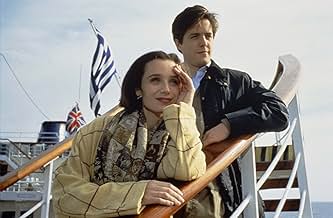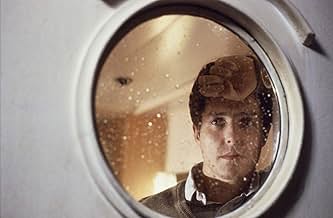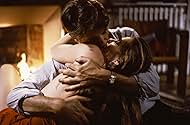Dopo averne sentito parlare, un passeggero di una nave da crociera sviluppa un'irresistibile infatuazione con la moglie di un eccentrico paraplegico.Dopo averne sentito parlare, un passeggero di una nave da crociera sviluppa un'irresistibile infatuazione con la moglie di un eccentrico paraplegico.Dopo averne sentito parlare, un passeggero di una nave da crociera sviluppa un'irresistibile infatuazione con la moglie di un eccentrico paraplegico.
- Regia
- Sceneggiatura
- Star
- Premi
- 1 vittoria e 2 candidature totali
Danny Wuyts
- Bandleader
- (as Danny Garcy)
Nathalie Galán
- Girl in Boutique
- (as Nathalie Galan)
Jim Adhi Limas
- Thai Maître D'
- (as Jim-Adhi Limas)
Recensioni in evidenza
Roman Polanski again explores the depths of the human psyche in Bitter Moon, a magnificent epic tale of obsessive lust and the oh-so-familiar winding course of a passionate romance gone sour.
Bitter Moon centers around a familiar Polanski theme, that we are capable of being both torturer and victim, and usually both simultaneously. For anyone who doubts the validity of much of the past century of French intellectual thought, from the likes of Andre Gide, Foucault, and others, see this movie. For anyone who has been in a painful twisted relationship, see this movie. You will understand it. Some of it might be hard to stomach but that is the nature of truly great filmmaking.
A beautifully crafted movie, almost lyrical at times, Bitter moon is set in contemporary Paris but is told in a series of long complex flashbacks superbly narrated by Oscar (a terrific Peter Coyote) to Nigel (Hugh Grant as the usual British prat), both passengers on a cruise ship to India. Nigel and his wife Fiona, played by Kirsten Scott-Thomas, are on a holiday to enliven a stable but stale marriage. The couples become embroiled through the lurid tale of Oscar and Mimi's (Emmanuelle Seigner) love affair. Emmanuelle, Polanski's real-life wife, is superb and her incredible performance takes her from sumptuous beauty to complete wreck, a performance that deserves far more praise than was received. The lack of attention to her performance in this movie is no doubt due to the notoriety in the puritanical American press of her husband.
As a whole, Bitter Moon may not be Polanski's best film but some periods of the movie represent his very best work. Throughout, limits are pushed to the brink of tastelessness but Polanski masterfully pulls back just in time. The direction is complex and highly sophisticated and the movie arouses a range of emotions from dread to empathy to disgust to hilarity. The story line is far too complicated to synopsize appropriately in this review. Bitter moon is a great film, one of this reviewer's top 10 for the 1990s. Another must see! A word of caution, however, Bitter Moon is not a good date movie.
Bitter Moon centers around a familiar Polanski theme, that we are capable of being both torturer and victim, and usually both simultaneously. For anyone who doubts the validity of much of the past century of French intellectual thought, from the likes of Andre Gide, Foucault, and others, see this movie. For anyone who has been in a painful twisted relationship, see this movie. You will understand it. Some of it might be hard to stomach but that is the nature of truly great filmmaking.
A beautifully crafted movie, almost lyrical at times, Bitter moon is set in contemporary Paris but is told in a series of long complex flashbacks superbly narrated by Oscar (a terrific Peter Coyote) to Nigel (Hugh Grant as the usual British prat), both passengers on a cruise ship to India. Nigel and his wife Fiona, played by Kirsten Scott-Thomas, are on a holiday to enliven a stable but stale marriage. The couples become embroiled through the lurid tale of Oscar and Mimi's (Emmanuelle Seigner) love affair. Emmanuelle, Polanski's real-life wife, is superb and her incredible performance takes her from sumptuous beauty to complete wreck, a performance that deserves far more praise than was received. The lack of attention to her performance in this movie is no doubt due to the notoriety in the puritanical American press of her husband.
As a whole, Bitter Moon may not be Polanski's best film but some periods of the movie represent his very best work. Throughout, limits are pushed to the brink of tastelessness but Polanski masterfully pulls back just in time. The direction is complex and highly sophisticated and the movie arouses a range of emotions from dread to empathy to disgust to hilarity. The story line is far too complicated to synopsize appropriately in this review. Bitter moon is a great film, one of this reviewer's top 10 for the 1990s. Another must see! A word of caution, however, Bitter Moon is not a good date movie.
Few critics took this film seriously when it was released, but it's now steadily beginning to garner attention. Today it ranks as one of Polanski's best.
"Bitter Moon" is a powerful film about love, and to view it as a sort of a soft-core titillation exercise by Polanski is to miss the point. The up-front sexuality of the film is there, not to merely provoke a cheap arousal from the viewer, but to point out how empty and hollow the couple's relationship really is. Most men will empathise with the morality (or lack of) in this confused relationship between an older man obsessed with his sexual object, and her adoration for him. The haunting reality is that for so many, the lack of depth in a relationship is frightening once the sexual desire diminishes.
9/10 - Filed with lush cinematography and romantic Parisian architecture, the film's only flaw is its Hugh Grant subplot. Everything else is electric, with a dark playfulness that only Polanski can deliver. Worth several viewings.
Note: Peter Coyote's room number, 5A, is the same as Tom Cruise's apartment from "Eyes Wide Shut". Both films have similar themes. When "Eyes Wide Shut" was released, Polanski made "The Ninth Gate", a film which features an "Eyes Wide Shut" styled ritual. Both films are similar in tone.
"Bitter Moon" is a powerful film about love, and to view it as a sort of a soft-core titillation exercise by Polanski is to miss the point. The up-front sexuality of the film is there, not to merely provoke a cheap arousal from the viewer, but to point out how empty and hollow the couple's relationship really is. Most men will empathise with the morality (or lack of) in this confused relationship between an older man obsessed with his sexual object, and her adoration for him. The haunting reality is that for so many, the lack of depth in a relationship is frightening once the sexual desire diminishes.
9/10 - Filed with lush cinematography and romantic Parisian architecture, the film's only flaw is its Hugh Grant subplot. Everything else is electric, with a dark playfulness that only Polanski can deliver. Worth several viewings.
Note: Peter Coyote's room number, 5A, is the same as Tom Cruise's apartment from "Eyes Wide Shut". Both films have similar themes. When "Eyes Wide Shut" was released, Polanski made "The Ninth Gate", a film which features an "Eyes Wide Shut" styled ritual. Both films are similar in tone.
I found this film extremely well done for several reasons I will nominate.
It debates some moral issues, how far is it acceptable for a society still full of consevative people, such as the one performed by Hugh Grant, to acept a relationship such as that of the main characters? It is totally at the border of normality (meaning normality not necessarily what's good but what's common). The film also touches strongly the theme of hipocrisie (probably wrong spelled, this word.) once more in the character of Hugh Grant who, despite showing all the time disgut and repugnace for the story he is being told, is always secretly desiring and wanting something equivalent to happen to him (this hipocratic attitude may be the result of growing up in a world and a society where this kind of sexual liberties and practices are repressed and in here once more we are taken to atrong moral issues which take us to rethink the whole thing...).
Apart from this questions this film makes me also think about the relationships between men and women... Is there an everlasting love? or at least an everlasting relationship?... Suddendly I recalled Schopenhauer who claimed that no man could be happy with only one woman... maybe this film is showing that he was right... the pace of the relationship between Mimi and the writer was so high that they just emptied all there possibilities very soon, but if we put that at the scale of a normal marriage, aren't all the possibilities also tried at the end of 10 20 or 30 years? Can a marriage last happy for both till "death tears them apart" ?...
Besides this few topics of discussion (to which I could add some more if I just remembered them right now) I found this film very well directed with some beautiful scenes... also some strongs scenes that stay with us... Excelent performances for the three leading roles... Kristin Scott Thomas is also good in here but not so as in other films also because her somewhat small part in this one didn't allow her to show more than she did. This film proves once more Roman Polansky as one of the greatest directors of our times, since he shows he is totally in control of every detail of direction (I enjoyed the increase of the speed together with the increase of intensity of the relationship among the couple). Good dialogues but specially excelent speeches of the writer whenever he becomes the narrator which is often... Also an excelent note for the soundtrack by Vangelis and other well known songs which appear along. A must see.
It debates some moral issues, how far is it acceptable for a society still full of consevative people, such as the one performed by Hugh Grant, to acept a relationship such as that of the main characters? It is totally at the border of normality (meaning normality not necessarily what's good but what's common). The film also touches strongly the theme of hipocrisie (probably wrong spelled, this word.) once more in the character of Hugh Grant who, despite showing all the time disgut and repugnace for the story he is being told, is always secretly desiring and wanting something equivalent to happen to him (this hipocratic attitude may be the result of growing up in a world and a society where this kind of sexual liberties and practices are repressed and in here once more we are taken to atrong moral issues which take us to rethink the whole thing...).
Apart from this questions this film makes me also think about the relationships between men and women... Is there an everlasting love? or at least an everlasting relationship?... Suddendly I recalled Schopenhauer who claimed that no man could be happy with only one woman... maybe this film is showing that he was right... the pace of the relationship between Mimi and the writer was so high that they just emptied all there possibilities very soon, but if we put that at the scale of a normal marriage, aren't all the possibilities also tried at the end of 10 20 or 30 years? Can a marriage last happy for both till "death tears them apart" ?...
Besides this few topics of discussion (to which I could add some more if I just remembered them right now) I found this film very well directed with some beautiful scenes... also some strongs scenes that stay with us... Excelent performances for the three leading roles... Kristin Scott Thomas is also good in here but not so as in other films also because her somewhat small part in this one didn't allow her to show more than she did. This film proves once more Roman Polansky as one of the greatest directors of our times, since he shows he is totally in control of every detail of direction (I enjoyed the increase of the speed together with the increase of intensity of the relationship among the couple). Good dialogues but specially excelent speeches of the writer whenever he becomes the narrator which is often... Also an excelent note for the soundtrack by Vangelis and other well known songs which appear along. A must see.
The film begins with the camera focused on the sea and the waves, and the music with the piano playing to good effect, then an increasingly enlarging zooming shot of a porthole. Then to the cruise liner where the four main characters are based. It is a story narrated and told by Oscar, played by Peter Coyote, who is wheelchair-bound, to Nigel, played by Hugh Grant, a man he meets on the cruise. Nigel is intrigued by an entwining and serpentine tale Oscar tells him, and so are we, and even though it starts to sound incredulous, he has to return to Oscar's quarters to hear more. The tale is so engrossing because it concerns Oscar's beautiful, sultry and seductive wife, Mimi, played mesmerisingly by Emmanuelle Seigner. Oscar is entranced at first with her and delves into all kinds of sexual games, then his passion for her begins to subside and he rejects her and leaves her alone on a plane. All the while Nigel's wife (Kristin Scott-Thomas) is becoming disillusioned with Nigel's fascination with Mimi and Oscar. I do not want to unveil anymore, just to implore you to watch this film and let it mesmerise you, like it did me. I felt as though I had to keep watching and somehow I did not want to leave and let go of it until the end.
This movie, despite what many reviewers seem to think, is about the differences between men and women with respect to sex and love. Whether it is with Oscar and Mimi's intense, wild, no holds barred relationship, or with boring, bland Nigel and Fiona.
Generally speaking, men can have sex with any amount of women, in any way or intensity. If she is up for it, chances are we will be too. Women on the other hand, require more of an emotional connection to the men they sleep with. The need to develop trust and comfort before completely letting go.
Oscar is the ultimate poon hound and became instantly infatuated with Mimi. They start with a normal passionate relationship, but ultimately, the excitement wears off. This happens in any and every relationship. They hike up the intensity by getting into bondage, S&M, etc. All the while, Oscar is all to aware, they are heading for the their peak and once it hits the top, it is only down hill from there.
The thing is, for the man in this case, it is only about the sexual passion. The woman is truly in love and the sex is the connection to her man. Even when the sexual excitement wears off, Mimi is still in love.
So, enter the conflict. Oscar is done, wants out. Mimi can't handle it and doesn't understand why he could possibly not love her the way she loves him. He tries to be compassionate and break up but she refuses to be let go, ultimate agreeing to be his slave just to stay near him.
This story is being told to a couple who have also been together for 7 years and are off to reignite their marriage. I believe that the same factors are in play with the stuffy British couple, Nigel and Fiona but only in a far more repressed manner. He's bored because he and his wife are doing the "normal" thing. No wild, kinky sex for them. But the emotion of love is there. If a couple is going to stay together forever, they simply have to get over the fact that physical passion is fleeting and if the bond of love is strong on both sides, they can make it work. Nigel isn't clear on this until the climactic ending.
This commentary isn't so much on the details of the plot, but what I believe the movie is trying to get across. Read the other posts for more details, but to understand what the movie is saying, understand that sex is sex for men and sex is love for women.
Generally speaking, men can have sex with any amount of women, in any way or intensity. If she is up for it, chances are we will be too. Women on the other hand, require more of an emotional connection to the men they sleep with. The need to develop trust and comfort before completely letting go.
Oscar is the ultimate poon hound and became instantly infatuated with Mimi. They start with a normal passionate relationship, but ultimately, the excitement wears off. This happens in any and every relationship. They hike up the intensity by getting into bondage, S&M, etc. All the while, Oscar is all to aware, they are heading for the their peak and once it hits the top, it is only down hill from there.
The thing is, for the man in this case, it is only about the sexual passion. The woman is truly in love and the sex is the connection to her man. Even when the sexual excitement wears off, Mimi is still in love.
So, enter the conflict. Oscar is done, wants out. Mimi can't handle it and doesn't understand why he could possibly not love her the way she loves him. He tries to be compassionate and break up but she refuses to be let go, ultimate agreeing to be his slave just to stay near him.
This story is being told to a couple who have also been together for 7 years and are off to reignite their marriage. I believe that the same factors are in play with the stuffy British couple, Nigel and Fiona but only in a far more repressed manner. He's bored because he and his wife are doing the "normal" thing. No wild, kinky sex for them. But the emotion of love is there. If a couple is going to stay together forever, they simply have to get over the fact that physical passion is fleeting and if the bond of love is strong on both sides, they can make it work. Nigel isn't clear on this until the climactic ending.
This commentary isn't so much on the details of the plot, but what I believe the movie is trying to get across. Read the other posts for more details, but to understand what the movie is saying, understand that sex is sex for men and sex is love for women.
Lo sapevi?
- QuizJames Woods was cast in the role of Oscar, but dropped out.
- BlooperIn the scene when Mimi cuts her hair for the first time and bakes a Turkey for Oscar, he is wearing the same turtle necked blue sweater that was ripped off with a razor blade during a previous sex game.
- Versioni alternativeThe version submitted to the India's CBFC made cuts to remove about 3 minutes of footage to achieve an 'ADULT' rating (Cert No.: 2729).
- Colonne sonoreFever
Written by Otis Blackwell (as John Davenport) and Eddie Cooley
Performed by Peggy Lee
Courtesy of MCA Caravelle Music France
EMI France
I più visti
Accedi per valutare e creare un elenco di titoli salvati per ottenere consigli personalizzati
- How long is Bitter Moon?Powered by Alexa
Dettagli
- Data di uscita
- Paesi di origine
- Lingue
- Celebre anche come
- Luna amarga
- Luoghi delle riprese
- Aziende produttrici
- Vedi altri crediti dell’azienda su IMDbPro
Botteghino
- Budget
- 5.000.000 USD (previsto)
- Lordo Stati Uniti e Canada
- 1.862.805 USD
- Fine settimana di apertura Stati Uniti e Canada
- 37.997 USD
- 20 mar 1994
- Lordo in tutto il mondo
- 1.862.805 USD
- Tempo di esecuzione2 ore 19 minuti
- Colore
- Proporzioni
- 1.85 : 1
Contribuisci a questa pagina
Suggerisci una modifica o aggiungi i contenuti mancanti




























